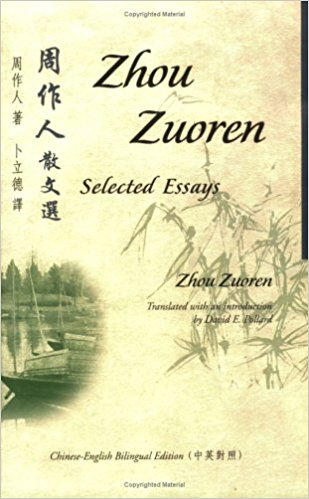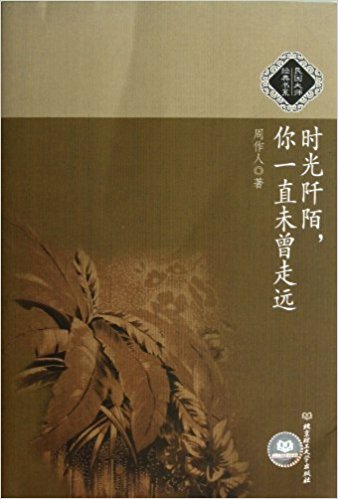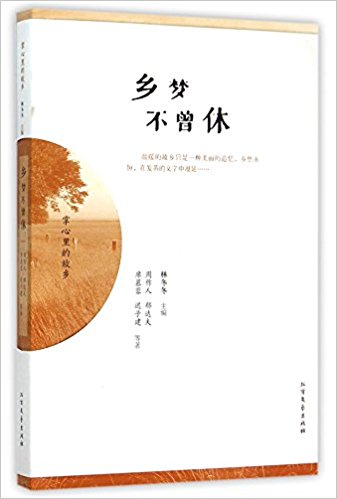Background
Mr. Chou was born in Shaoxing, Zhejiang, China, January 16, 1885. He deied in Beijing, China, May 6, 1967.


(Zhou Zuoren (1885–1967), the brother of writer Lu Xun, wa...)
Zhou Zuoren (1885–1967), the brother of writer Lu Xun, was one of the most controversial intellectuals in modern China. Radically at odds with many of his contemporaries, Zhou opposed the May Fourth reformers. His work was banned in both mainland China and Taiwan for many years as a result of his collaboration with the Japanese puppet government during the Sino-Japanese War. This collection of essays presents an alternative vision of China as a nation, questioning the dichotomy between modernity and tradition and espousing a literary style that values openness and individualism.
http://www.amazon.com/gp/product/9629961989/?tag=2022091-20

(Zhou Zuorens articles can stand careful reading and appre...)
Zhou Zuorens articles can stand careful reading and appreciation. His fame is far beyond that of his contemporary authors. He is as learned as Luxun. He has thinkers mind and artists inspiration. He has his own writing style. He is good at writing essays, talking about the world, human society, and the past. In the book On the Path of Time Never Have You Gone Far Away, it collects many classic prose, essays and by-talks, such as A No-no for Women, In Memory of Xu Zhimo, On Reading Under the Light, The Drama Troupe in the Village, each one is excellent. As readers, we can feel his emotional appeal in his words which show that he is indifferent to fame or interest, and find some bright in the boring literature and history.
http://www.amazon.com/gp/product/7564069899/?tag=2022091-20

(This book is one of the Palm Hometown Series and takes no...)
This book is one of the Palm Hometown Series and takes nostalgia as the theme. It includes over 60 articles of more than 40 celebrities, such as Zhu Ziqing, Yu Dafu, Xiao Qian and Wu Guanzhong, about homeland customs and childhood anecdotes, showing their deep reminiscence for the homeland. The deep nostalgia brings people endless aftertastes.
http://www.amazon.com/gp/product/7531734818/?tag=2022091-20

(Mallotus Essays -the Self Assembed Set of Zhou Zuoren (Ch...)
Mallotus Essays -the Self Assembed Set of Zhou Zuoren (Chinese Edition) [Zhou Zuo Ren] on Amazon.com. *FREE* shipping on qualifying offers.
http://www.amazon.com/gp/product/753021084X/?tag=2022091-20
周作人
writer and university professor
Mr. Chou was born in Shaoxing, Zhejiang, China, January 16, 1885. He deied in Beijing, China, May 6, 1967.
Chou Tso ]en studied Chinese and Western literatures and possesses an extensive knowledge of both. He was educated at the Jiangnan Naval Academy as a teenager. Following the steps of his brother Lu Xun, he left for Japan to pursue his studies in 1906.
During his stint in Japan, he began studying Ancient Greek, with the aim of translating the Gospels into Classical Chinese, and attended lectures on Chinese philology by scholar-revolutionary Zhang Binglin at Rikkyo University, although he was supposed to study civil engineering there.
Mr. Chou returned to China in 1911, with his Japanese wife, and began to teach in different institutions.
He contributed articles and essays to La Jeunesse (New Youth) journal at Peking (Beijing) and became well-known as a writer, translator and compiler of many best stories from Japan and European countries. Chou Tso-jen became chancellor of Beijing University in 1939.
In 1945, after the Second Sino-Japanese War, Mr. Chou was arrested for treason by the Nationalist government of Chiang Kai-shek, stemming from his alleged collaboration with the Wang Jingwei government during the Japanese occupation of north China. Chou Tso-jen was sentenced to 14 years in Nanjing Prison, but was released in 1949 by the Communist government after a pardon. Later that year he returned to Beijing. Mr. Chou continued to write and translate, but published his works under pseudonyms. He died during the Cultural Revolution.
(Zhou Zuoren (1885–1967), the brother of writer Lu Xun, wa...)
(Mallotus Essays -the Self Assembed Set of Zhou Zuoren (Ch...)
(This book is one of the Palm Hometown Series and takes no...)
(Zhou Zuorens articles can stand careful reading and appre...)
Chou Tso-jen was a key figure in the May Fourth Movement. He was an advocate of literary reform. In a 1918 article, he called for a "humanist literature" in which "any custom or rule that goes against human instincts and nature should be rejected or rectified". As examples, Mr. Chou cited children sacrificing themselves for their parents and wives being buried alive to accompany their dead husbands. His ideal literature was both democratic and individualistic. On the other hand, Chou Tso-jen made a distinction between "democratic" and "popular" literature. Common people may understand the latter, but not the former. This implies a difference between common people and the elite. Mr. Chou condemned elite traditional performances like the Beijing opera. He called it "disgusting," "nauseating," "pretentious" and referred to the singing as "a weird inhuman sound."
His short essays, with their refreshing style, won him many readers up to the present day. An avid reader, he called his studies "miscellanies", and penned an essay title "My Miscellaneous Studies" (我的雜學). Chou Tso-jen was particularly interested in folklore, anthropology and natural history. One of his favorite writers was Havelock Ellis. Mr. Chou was also a prolific translator, producing translations of classical Greek and classical Japanese literatures. Most of his translations are pioneering, which include a collection of Greek mimes, Sappho's lyrics, Euripides' tragedies, Kojiki, Shikitei Sanba's Ukiyoburo, Sei Shōnagon's Makura no Sōshi and a collection of Kyogen. He considered his translation of Lucian's Dialogues, which he finished late in his life, as his greatest literary achievement.
He was a leading figure of modern Chinese literature. Writing in Vernacular Chinese as well as Classical Chinese, Lu Xun was a short story writer, editor, translator, literary critic, essayist, poet, and designer. In the 1930s he became the titular head of the League of Left-Wing Writers in Shanghai.
